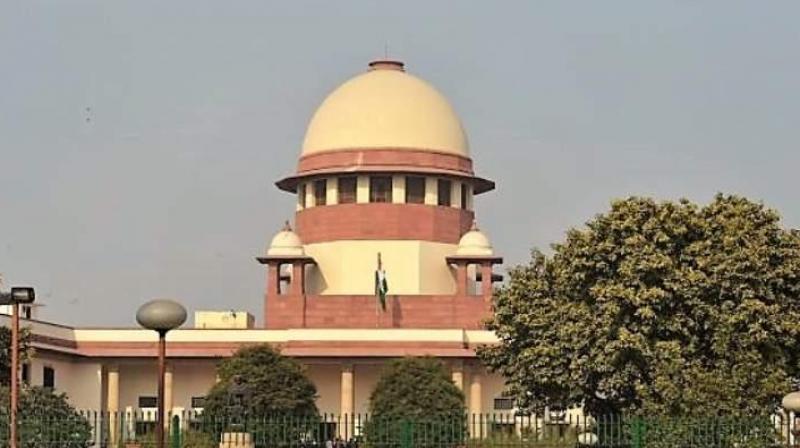Relief for MSMEs: Centre waives off compound interest on loans during pandemic

New Delhi: In a relief to individual borrowers and medium and small industries, the Centre has agreed in the Supreme Court to waive compound interest (interest on interest) charged on loans of up to Rs 2 crores for a six-month moratorium period announced due to the COVID-19 pandemic.
It said the government will seek due authorisation from parliament for making appropriate grants in this regard and “the endeavour shall be over and above the support of Rs 3.7 lakh crore to MSMEs, Rs 70,000 crore for home loans etc. already extended through the Garib Kalyan and Aatma Nirbhar packages announced by government earlier”.
In an affidavit filed by Union finance ministry on behalf of the Union of India, it said that the relief to all borrowers in respect of compounding of interest during the period of moratorium would be admissible to the categories specified irrespective of whether the borrowers had availed the moratorium or not.
“The government, therefore, has decided that the relief on waiver of compound interest during the six-month moratorium period shall be limited to the most vulnerable category of borrowers. This category of borrowers, in whose case, the compounding of interest will be waived, would be MSME loans and personal loans of up to Rs 2 crore,” it said.
The loans were categorised into eight categories by the government including MSME (Micro, Small and Medium Enterprises), education, housing, consumer durable, credit card dues, auto, personal, and consumption.
It further said that any individual/entity whose loan amount is more than Rs 2 crore will not be eligible for waiver of the compounding of interest.
It said in view of the cumulative circumstances, after careful consideration and weighing all possible options, the government has decided to continue the tradition of hand holding of small borrowers.
The affidavit has been filed by the Centre in response to a batch of pleas in the apex court raising issues pertaining to validity of RBI's March 27 circular which allowed lending institutions to grant moratorium on payment of instalments of term loans falling due between March 1, 2020 and May 31 this year due to the pandemic.
Later, the period of moratorium was extended till August 31.
Earlier, in the matter, the Centre had told the top court that waiver of interest on deferred EMIs during moratorium period would be against “the basic canons of finance” and unfair to those who repaid loans as per schedule.
The Centre in the fresh affidavit said that waiving compound interest would result in very substantial and significant financial burden and it is impossible for the banks to bear the burden without passing on the financial impact to the depositors or affecting their net worth adversely, which would not be in the larger national economic interest.
It said that the only solution under the circumstances is that “the government bears the burden resulting from waiver of compound interest and this court would be satisfied that government bearing this burden would naturally have an impact on several other pressing commitments being faced by the nation”.
Regarding downgrading of loan accounts from standard to Non-Performing Asset (NPA) and the consequential impact on credit ratings, the Centre said that any account becoming non-performing even due to the bank's or any other delay, will not suffer from being labelled as NPA.
The Centre said that it has suspended from March 25, the operation of provisions of the Insolvency and Bankruptcy Code, 2016 (IBC) to protect corporate borrowers impacted by the COVID-19 crisis.
It said that the word “moratorium” is categorically defined by the RBI while issuing various circulars which show that “moratorium” was never intended to be “waiver of interest” but “deferment of interest”.
The government said borrowers have understood the difference between waiver in interest on loan and deferment of payment of instalments for that loan. Therefore, a majority of the borrowers have not taken benefit of moratorium which is nothing but deferment of payments of instalments.
“Though it may not be possible to give the exact percentage of the borrowers who have not availed of the moratorium and have deposited payment instalments, approximately such class would be more than 50 per cent,” it said.
The Central government said that if it were to consider waiving interest on all loans and advances to all classes and categories of borrowers for a six-month period for which the moratorium was made available under the RBI circulars, the estimated amount foregone will be more than Rs 6 lakh crore.
“If the banks were to bear this burden, it would necessarily wipe out a substantial and a major part of their net worth, rendering most of the banks unviable and raising a very serious question mark over their very survival,” it said.
On September 28, the Centre had informed the top court that a decision is likely in two to three days over charging of compound interest by banks on instalments which were deferred during the moratorium period in view of the COVID-19 pandemic.
A bench headed by Justice Ashok Bhushan is likely to take up the matter for hearing on October 5.
On September 3, in a relief to stressed borrowers who are facing hardships due to the impact of the pandemic, the top court had said that accounts which were not declared as non-performing assets till August 31 this year, shall not be declared NPA till further orders.

